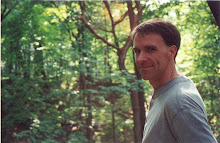![]()
After my tour around Nyack, I made my way to Maria's, where she and Leslie and I were joined by Maria's husband, Grey--a lanky fellow with a balding forehead. He wore a yellow oxford shirt and punctuated his resonant speech with a sharp laugh and a forearm shooting upwards. Pregnant Maria sprawled on the couch beside him, while Leslie and I parked ourselves in separate chairs opposite.
"What you are doing has very few precedents," Grey said, "What'd you call it: 'anthropological art criticism?' It's that--slash--travelogue--slash--Working by Studs Terkel."
"Exactly," I responded. "I actually graduated from Northwestern with a degree in an obscure major all about oral storytelling: The Oral Interpretation of Literature."
"Ha," Grey roared. "I have a Theater degree from Northwestern."
We gossiped about teachers we knew in common and learned that I had seen a show in 1989 in Gloucester, Massachusetts, that Grey had directed.
Grey continued, "It's almost like this kind of joke Hopper is playing. 'My paintings will hang in all these different towns. And someone is going to come along and have to figure me out by traveling all around.' Hopper didn't stay put. And that was part of his message. 'I'm gonna do urban; I'm gonna do rural; I'm gonna do coast.' People in his day were trying to figure out 'How do I live in the city?'"
Leslie noted, "His rural is never as lonely as being alone in the city."
"But that's the thing about the city and the country," Maria pointed out. "It's dislocation. And that's the American dream, in an odd way."
Grey said, "Hopper's rural stuff is like the country store in Seven A.M."
Maria turned to Leslie, "That's the place where I told you I looked at the painting and said, 'I know that place'."
Leslie objected, "But it's not … true. That cannot be (what do you call it?) 'certified.' Nobody knows exactly where something was painted."
"Hopper," Maria observed, "had a woman that was very devoted to him and that he also loved. He did exactly what he loved in his painting. He had his car, did his travels. He had a house, Washington Square, the most stimulating environment to be in at that time in the whole country, and in Cape Cod, the most empty, beautiful space you could ever want. Wasn't he a really happy guy? Yet the paintings don't depict that kind of euphoria, or even marginal happiness."
Grey said, "Forget about happiness. Contentment is the deeper, richer thing, and you see that in him. Sunshine is pretty happy."
Maria said, "Yeah, but it's kind of missing that soul. The people in his paintings: Where's the spirit? If it's there, it's murky and it's way down in."
Leslie said, "I think he just wanted to record things, moments."
Maria said, "I think he was very Zen, in the sense of that moment, that light, that building, that day."
Leslie said, "You don't have to solve the human dilemma in a painting. You can report or reveal this lonely side of being a human being and isolated, and it doesn't necessarily have to be negative or sad. It just is."
20081112
59 Nyack Maria Leslie Grey
Subscribe to:
Post Comments (Atom)




No comments:
Post a Comment